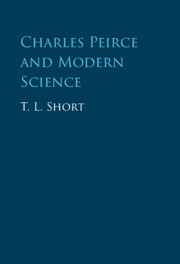Book contents
- Charles Peirce and Modern Science
- Charles Peirce and Modern Science
- Copyright page
- Dedication
- Contents
- Preface
- Acknowledgments
- A Note on Citation of Sources
- Chapter 1 Peirce’s Life in Science: 1859–1891
- Chapter 2 Peirce’s Concept of Science
- Chapter 3 Modern Science Contra Classical Philosophy
- Chapter 4 The Meaning of Pragmatism
- Chapter 5 Misleading Appearances of System
- Chapter 6 Devolution of the Cosmogonic Program
- Chapter 7 Experiments Expanding Empiricism
- Chapter 8 Phaneroscopy and Realism
- Chapter 9 Normative Science
- Chapter 10 Modern Science Contra Modernity
- Bibliography
- Index
Chapter 2 - Peirce’s Concept of Science
Published online by Cambridge University Press: 26 October 2022
- Charles Peirce and Modern Science
- Charles Peirce and Modern Science
- Copyright page
- Dedication
- Contents
- Preface
- Acknowledgments
- A Note on Citation of Sources
- Chapter 1 Peirce’s Life in Science: 1859–1891
- Chapter 2 Peirce’s Concept of Science
- Chapter 3 Modern Science Contra Classical Philosophy
- Chapter 4 The Meaning of Pragmatism
- Chapter 5 Misleading Appearances of System
- Chapter 6 Devolution of the Cosmogonic Program
- Chapter 7 Experiments Expanding Empiricism
- Chapter 8 Phaneroscopy and Realism
- Chapter 9 Normative Science
- Chapter 10 Modern Science Contra Modernity
- Bibliography
- Index
Summary
Modern science is systematic inquiry, not systematic knowledge. It cannot be defined by its method or by its metaphysics, since these are amended as inquiry progresses. The norms of science are therefore the business of science and represent empirical discoveries. Peirce’s conception of science is nontechnical and for that reason difficult: he identified it by its ’spirit’, a restless quest for concrete discovery fruitful of further discovery. Theory, then, is no longer the end of inquiry, a resting place, but is, instead, a means to further discovery. Whereas philosophical systems were meant to be coherent and comprehensive, a theory that grounds research cannot be complete and any incoherence in it is a stimulus, not a fatal flaw. But the pursuit of concrete knowledge requires specialization and an evolving network of specialists. Peirce reversed the usual deprecation of specialization: its aim is growth of a knowledge that transcends any individual consciousness.
Keywords
- Type
- Chapter
- Information
- Charles Peirce and Modern Science , pp. 17 - 38Publisher: Cambridge University PressPrint publication year: 2022

